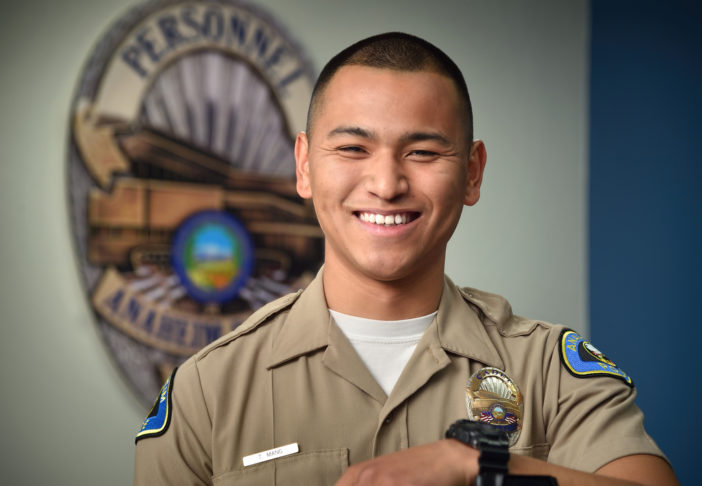Cadets at the Anaheim Police Department do it all, from running the front counter to working in forensics, personnel, auto theft, homicide, and more.
In fact, the department’s 40-plus cadets assist officers and command staff in nearly all the agency’s details.
“(The cadets are) a pretty tremendous asset for the unit,” said Sgt. Jeff Mundy, who oversees the homicide unit. “They handle a lot of different tasks.”
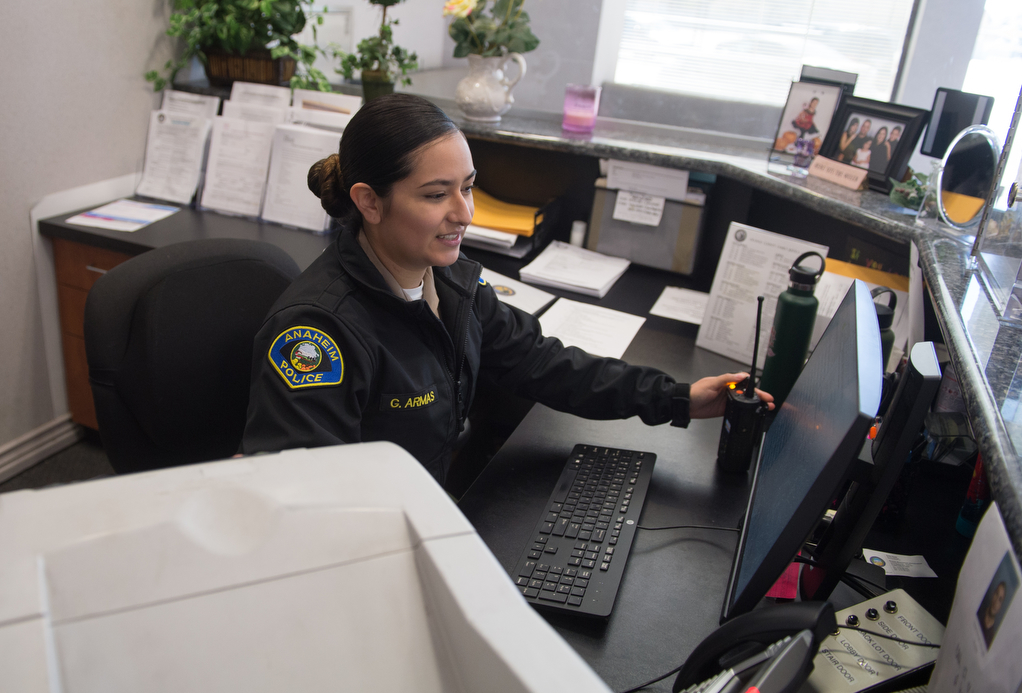
Anaheim Police Department Cadet Geraldi Armas works the front desk, filling in for a co-worker who is on family leave, at the Orange County Family justice Center.
Photo by Stephen Carr/Behind the Badge
They start at the front counter in a fast-paced, customer service position, and once they are comfortable with the wide range of duties and public requests they can be assigned to a specific detail – but still spend at least a day per week at the counter to keep their skills sharp.
The cadets, all college students working part-time at the police department, are put in the best possible position to gain work experience and connect with others in the field. As the face of the department at the front counter, they must present themselves professionally at all times.
“Sometimes when we’re at the front counter people will come in and they’ll ask us why we look so young or how as a college student we have the knowledge to be able to fix their problem,” Cadet Jillian Klotz said. “I think it’s that interesting piece of being able to show that we have the knowledge that can assist them.”
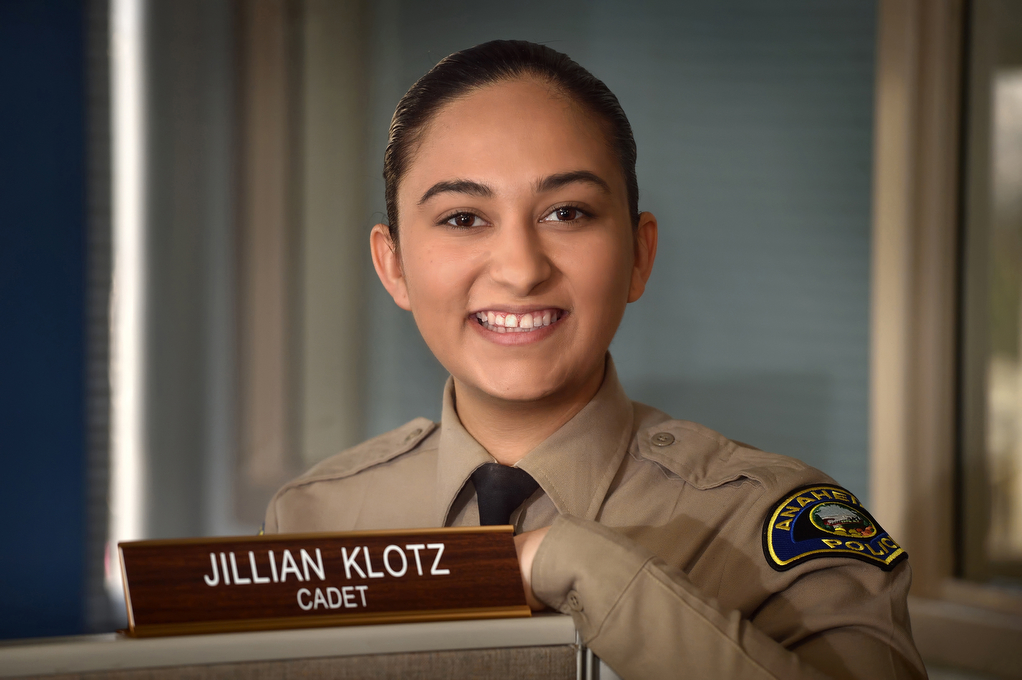
Anaheim Police Cadet Jillian Klotz at her desk in the auto theft and burglary detail.
Photo by Steven Georges/Behind the Badge
It’s a challenging job where anything can happen.
Cadet Geraldi Armas, 22, was working the counter when a man entered the crowded lobby with a machete in his pocket. She turned on her body-worn camera and asked everyone to move to the side of the lobby as other cadets contacted dispatch.
“He just had it in his pocket and it turned out that he was drunk,” said Armas, who is now stationed at the Orange County Family Justice Center (OCFJC). “The officers dealt with it very quickly.”
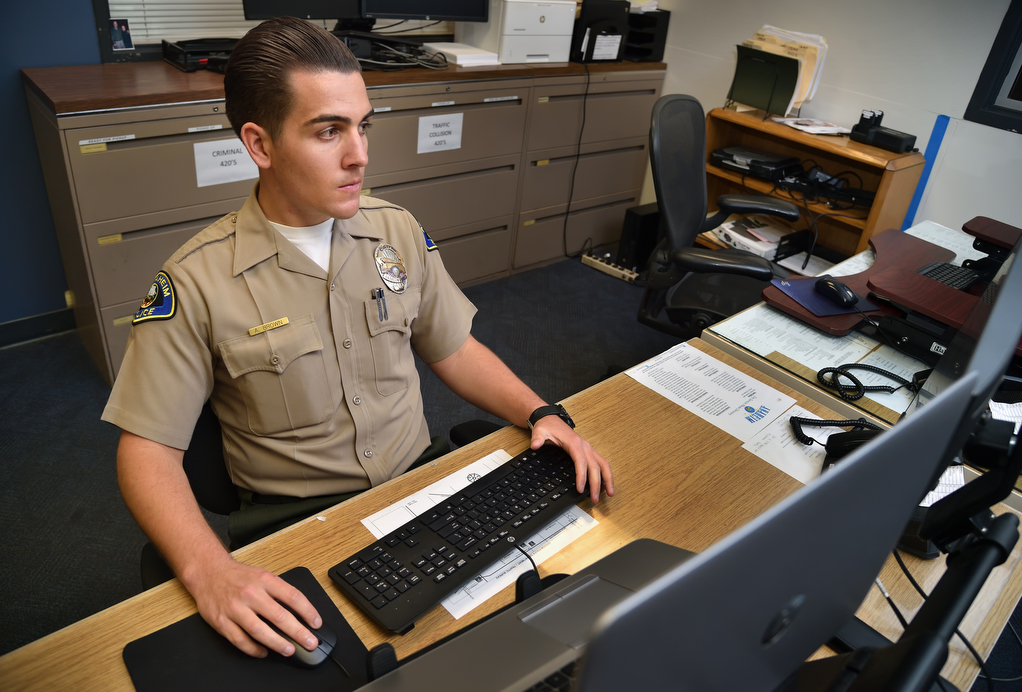
Anaheim Police Cadet Austin Brown works at the front office of Anaheim police headquarters.
Photo by Steven Georges/Behind the Badge
Teamwork among the cadets is what allows these incidents to end safely and smoothly. They train and practice at least once a month to handle all sorts of events.
“What’s nice is you’re working with everybody as a team and you all are so much alike,” Homicide Cadet Austin Brown said. “You all know that you have something to accomplish here today, so you all work together really well to make sure that it gets done the best way possible.”
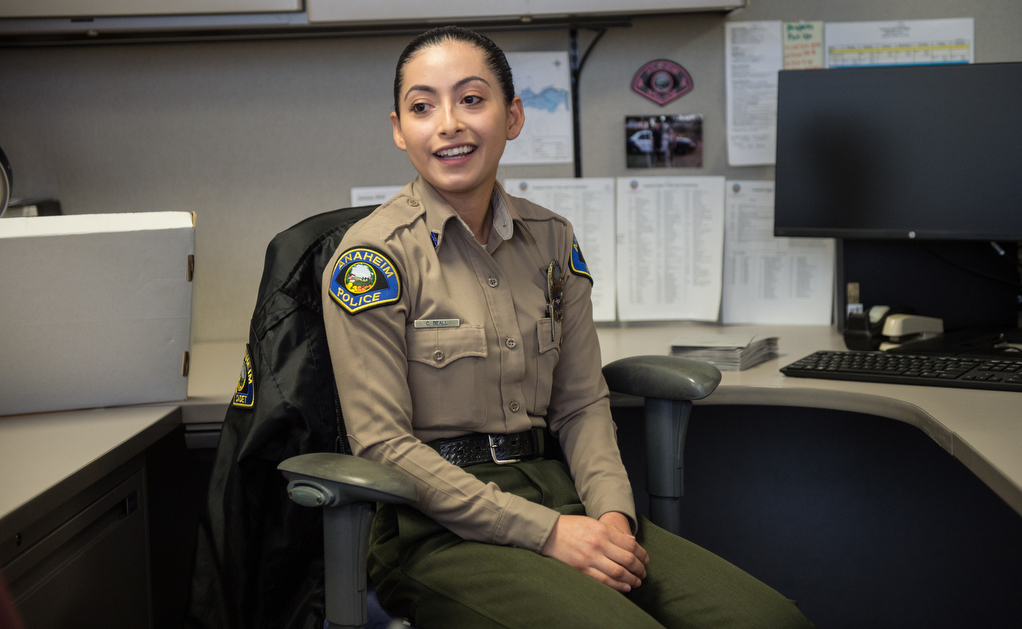
Anaheim Police Department Cadet Crystal Beall inside the crime lab at the Anaheim Police Department.
Photo by Stephen Carr/Behind the Badge
Charting a future career
Armas, who grew up in Anaheim, joined the Explorer program at age 16 and was inspired to change her goal from a military career to law enforcement.
On the OCFJC detail, Armas helps at the front desk, where she assists victims of family crime and sexual assault in getting temporary restraining orders, finding emergency housing, and connecting with other resources.
“I love the fact that I get to help my community and I really give a face that people recognize that maybe will comfort them,” she said.
She also handles discovery requests for court cases, warrant packets for detectives, and anything else that’s needed.
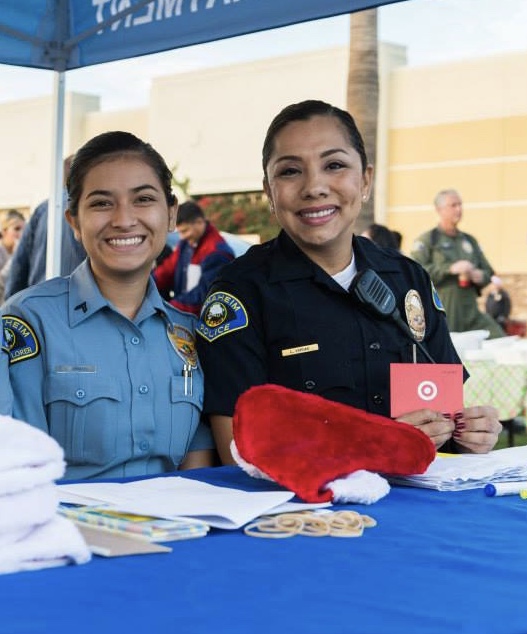
Anaheim Police Explorer Geraldi Armas with Det. Vargas of the Anaheim Police Department.
Photo provided by Geraldi Armas
“I’ve learned so much,” Armas said. “It’s a lot of understanding people, being empathetic, respect. Respect goes a long way, even to people that might not show that back to you.”
Before joining the OCFJC detail she worked with at-risk kids through the Anaheim Cops 4 Kids program. She is inspired by seeing her friends in the Explorer and cadet programs start their careers in law enforcement and elsewhere.
“I love building these connections,” Armas said. “Especially being part of an agency like Anaheim that’s full of hardworking, dedicated, amazing people. I feel very grateful and lucky.”
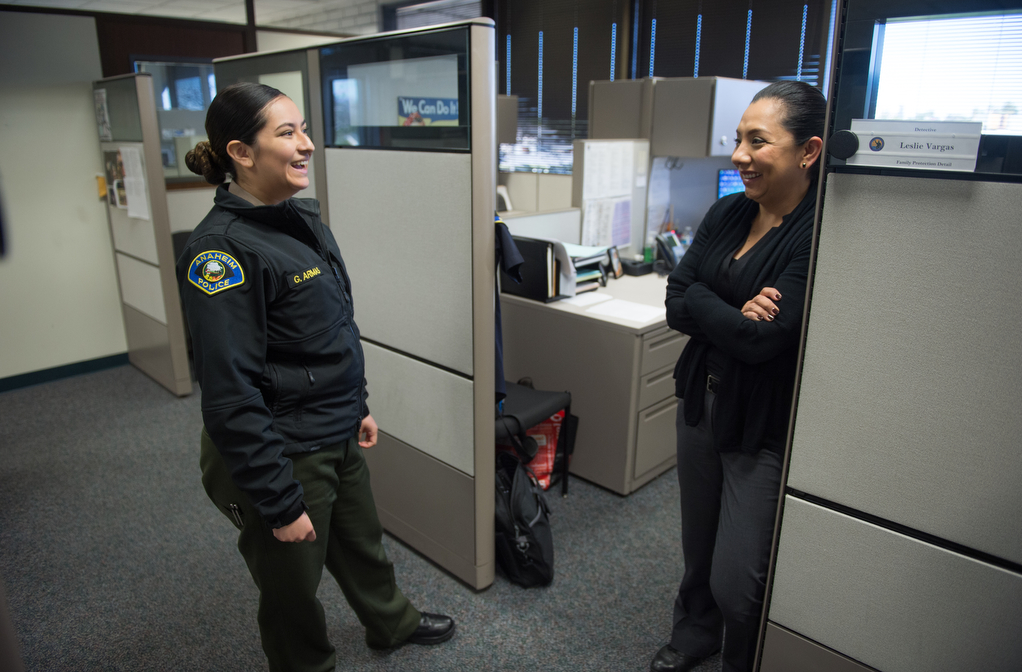
Anaheim Police Department Cadet Geraldi Armas talks with her mentor, Anaheim Police Detective Leslie Vargas, at the Orange County Family Justice Center.
Photo by Stephen Carr/Behind the Badge
Becoming the ideal new hire
Forensic Services Cadet Crystal Beall worked at the OCFJC detail before transferring into forensics, where she hopes to spend her career. Beall was recently hired as a full-time employee in the forensics unit.
“It’s become such a competitive field because everyone is interested in true crime and mysteries and solving crimes,” Beall said. “I had to do something to give me that competitive edge… This is, I feel like, my home. I’m committed to this agency.”
Beall was a history major at Cal State Long Beach when she discovered forensic science. She was telling her department chair that she wasn’t interested in a doctorate in history or a career in the field when the chair suggested adding a forensic studies minor.
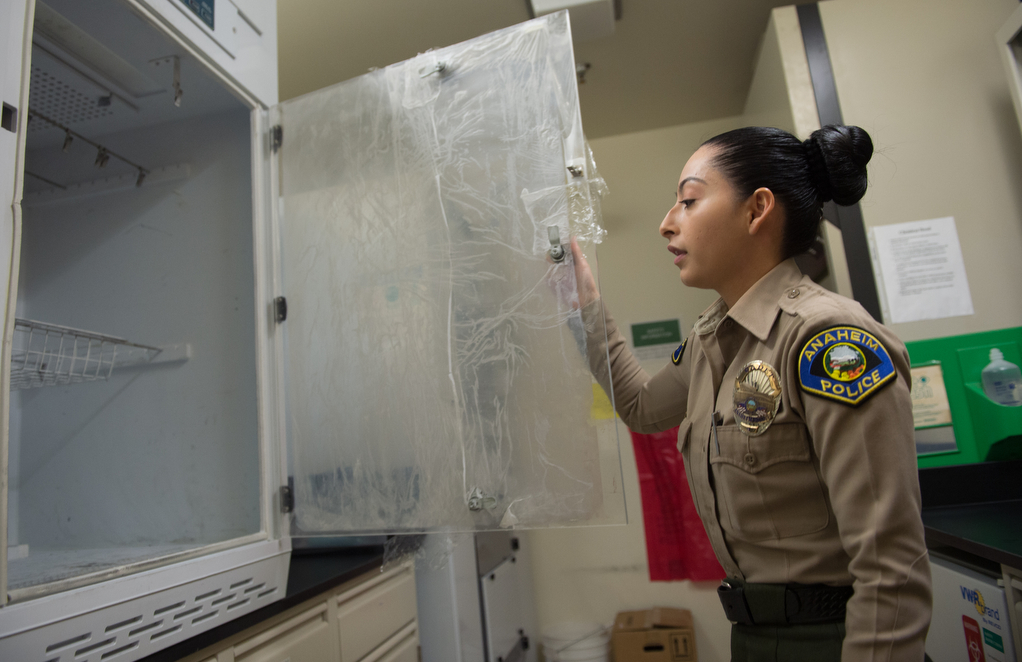
Anaheim Police Department Cadet Crystal Beall inside the forensic lab.
Photo by Stephen Carr/Behind the Badge
“Once I took my Criminal Justice 101, I knew,” Beall recalls. “This is so interesting. There are so many different career paths that you can take within law enforcement…so I started taking those forensic classes and then I realized this is exactly what I’ve been looking for but hadn’t found.”
Beall has certificates in basic applied forensic science and crime analysis, and crime scene investigation, in addition to her bachelor’s degree in history and minor in forensic studies.
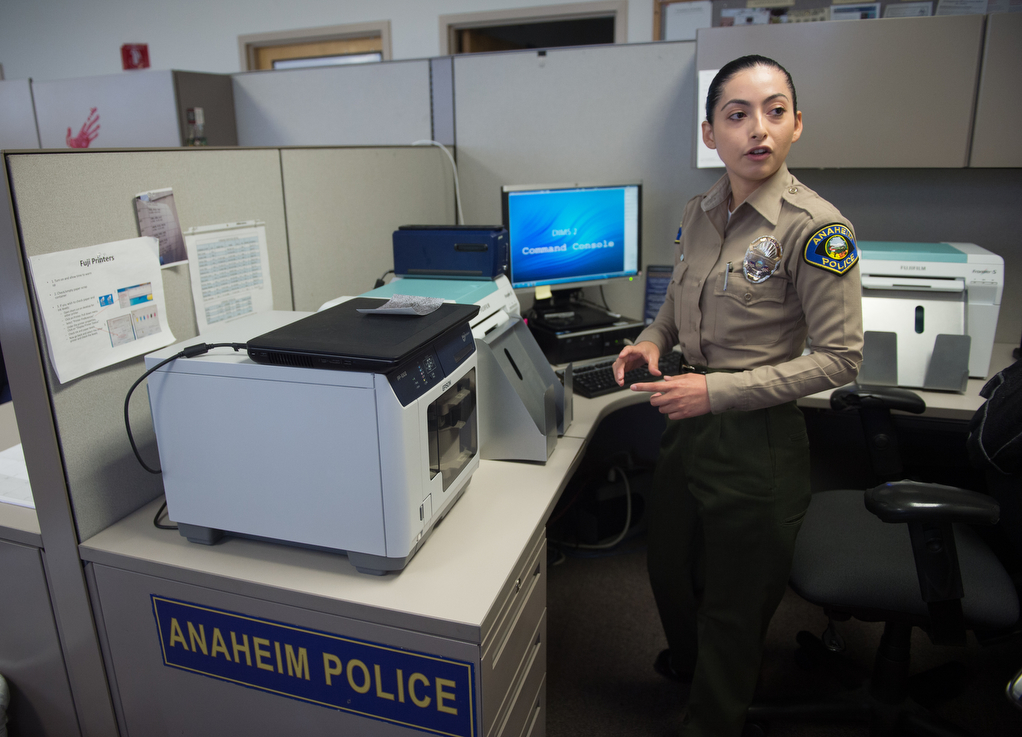
Anaheim Police Department Cadet Crystal Beall creates CDs and DVDs for court cases from her work space in the forensic lab at the Anaheim Police Department.
Photo by Stephen Carr/Behind the Badge
At the Anaheim Police Department, Beall tackled myriad duties in the forensic services detail. She managed digital evidence, made CDs and DVDs for court cases, organized fingerprint cabinets, assigned fingerprint analysis and firearm processing (for DNA and prints) to forensic scientists, maintained lab supplies, and photographed important events such as promotions and swearing-in ceremonies.
“We’re very fortunate here,” Beall said. “Anaheim allows us to do so much and has that trust and faith in us that we will do it.”
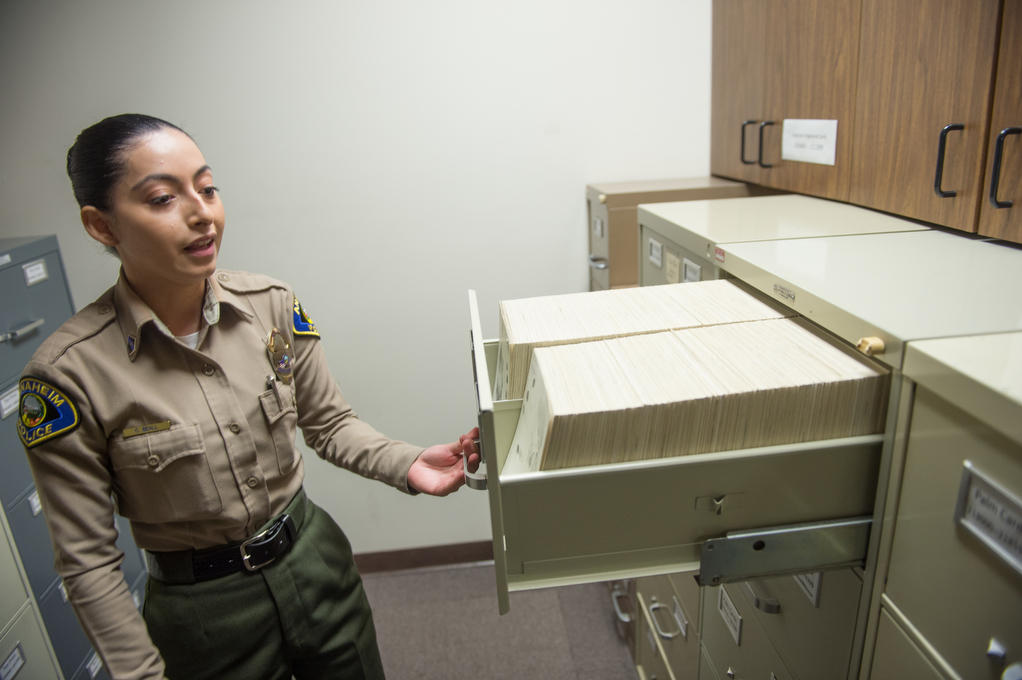
Anaheim Police Department Cadet Crystal Beall shows the thousands of fingerprint records inside the forensic lab at the Anaheim Police Department.
Photo by Stephen Carr/Behind the Badge
Lifelong learning
Personnel Cadet Tommy Mang was encouraged to seek a future in law enforcement by several adults during his high school years. First, it was his best friend’s dad, a pilot for the Los Angeles Police Department.
“He saw the quality traits in me and he said I’ll make a good police officer one day,” Mang recalls. His girlfriend’s dad, an Orange County Sheriff’s Department deputy, also encouraged him to become an officer. When a classmate suggested he join the Anaheim Police Department’s cadet program, Mang discovered they were right. He’s now been a cadet for nearly two years, and also coaches at Edison High School in Huntington Beach.
“I love it here,” Mang said. “I love coming to work every day. I love working with the background investigators. It’s fun.”
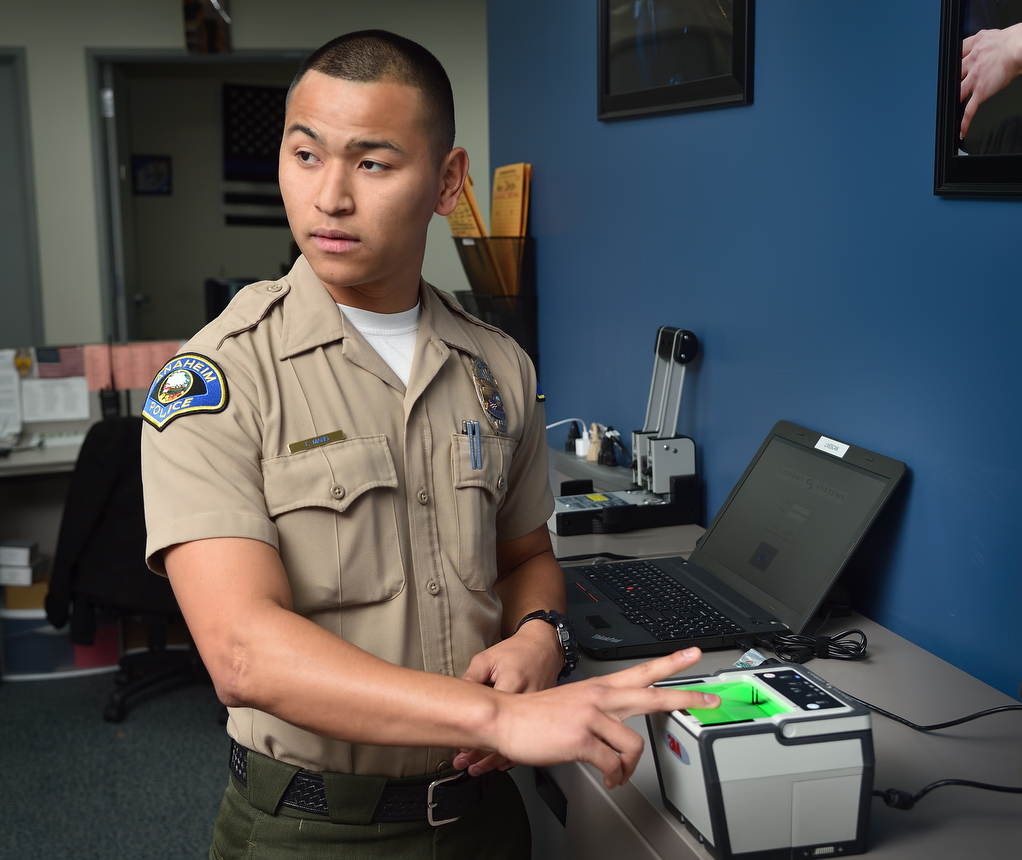
Anaheim Police Cadet Tommy Mang demonstrates the electronic fingerprint scanner he uses in a live scan while processing Anaheim police applicants.
Photo by Steven Georges/Behind the Badge
Mang enjoys the challenge of learning new things. He remembers his first weeks as a cadet, watching carefully as instructors explained how to take a police report. Since then, he’s mastered most tasks at the front counter and is now part of the personnel department preparing for officer and promotion testing; taking LiveScans for new hires; creating access cards, police and retired IDs; setting up the police agility test space; and speaking at cadet orientation.
“I learn something new every day and I get to work with like-minded individuals that have the same goals or similar goals as me to succeed,” Mang said. “This job has given me many opportunities and has really opened my eyes to law enforcement that I would have never gotten if I just studied it through a textbook. It gives me real life experiences, experiences I can talk about, experiences that I can learn from.”
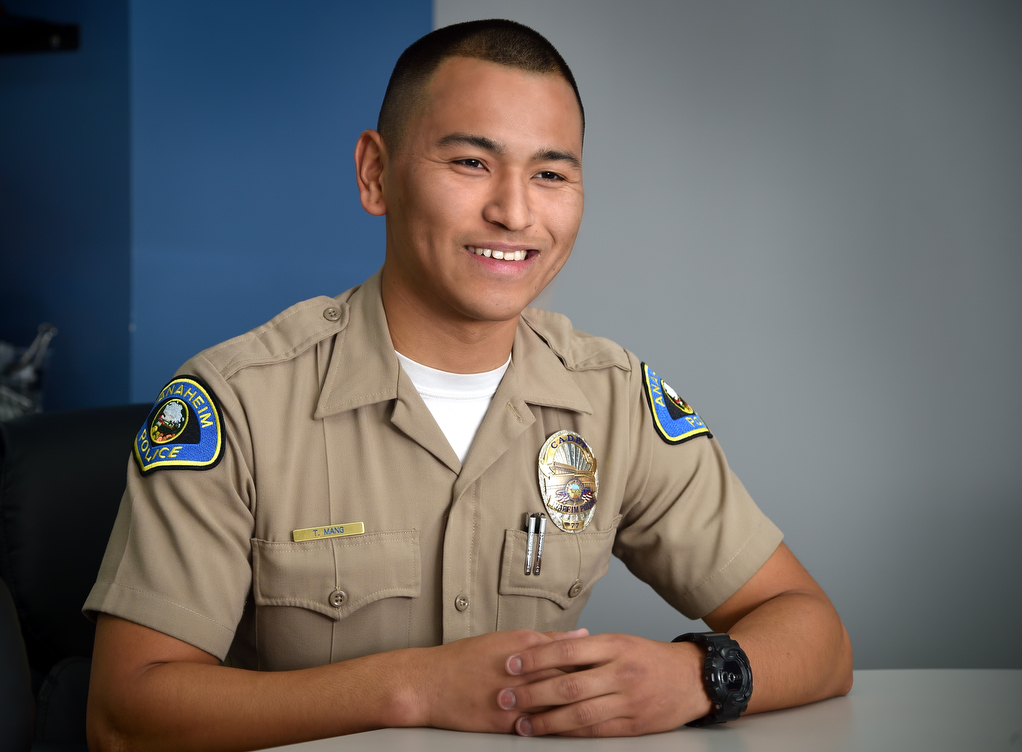
Anaheim Police Cadet Tommy Mang talks about his work at the department.
Photo by Steven Georges/Behind the Badge
Like Armas, Mang has built life-long friendships at the Anaheim Police Department.
“I’ve seen a lot of my peers get hired as a police officer and it’s just very humbling,” said Mang, who has associate degrees in liberal arts and criminal justice, and is working toward a bachelor’s degree in criminal justice. “My ultimate goal is to be a police officer.”
Giving cadets access to the variety of jobs at the police department generates interest in law enforcement careers and provides them with valuable work experience.
“We’ve had several homicide cadets that have ended up becoming officers with Anaheim and other agencies,” Mundy said. “To see somebody actually get hired and be successful in their career is pretty cool.”
Shared passions and goals
Brown, a homicide cadet, has wanted to be a police officer for as long as he can remember, to follow in the footsteps of his father, a SWAT officer with the Los Angeles Police Department.
Brown was inspired by “knowing how much job satisfaction he gets from his job and hearing the stories.”
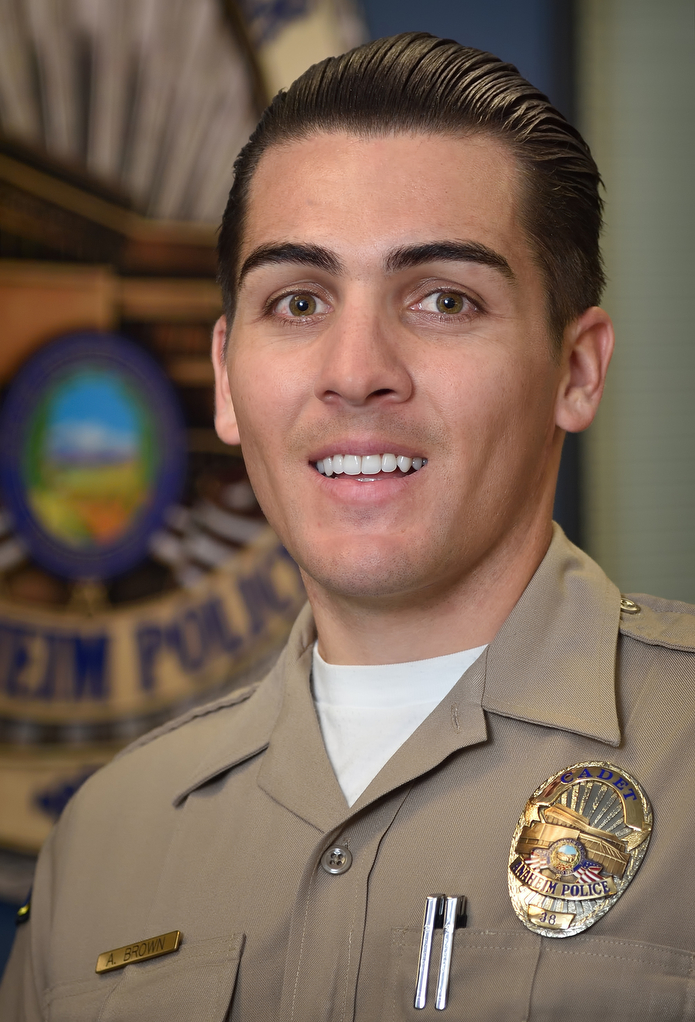
Anaheim Police Cadet Austin Brown is currently working in the homicide unit.
Photo by Steven Georges/Behind the Badge
He’s been a cadet for more than two years and is a political science major at Cal State San Marcos with a minor in sociology. He hopes to join the homicide detail one day as a full-time officer. As a cadet, he spends most of his time working on discovery requests for homicide cases.
“It’s a big responsibility,” Brown said. “It is your job to get that evidence to the court.”
Having a cadet handle discovery requests can save a detective a half-day’s work, allowing them to focus that time on an active case, Mundy said, which makes the unit more efficient.
“It really does decrease the burden on (the detectives),” Mundy said.
When Brown is not working on discoveries he converts cold cases from audio and video tapes and handles miscellaneous requests from the detectives.
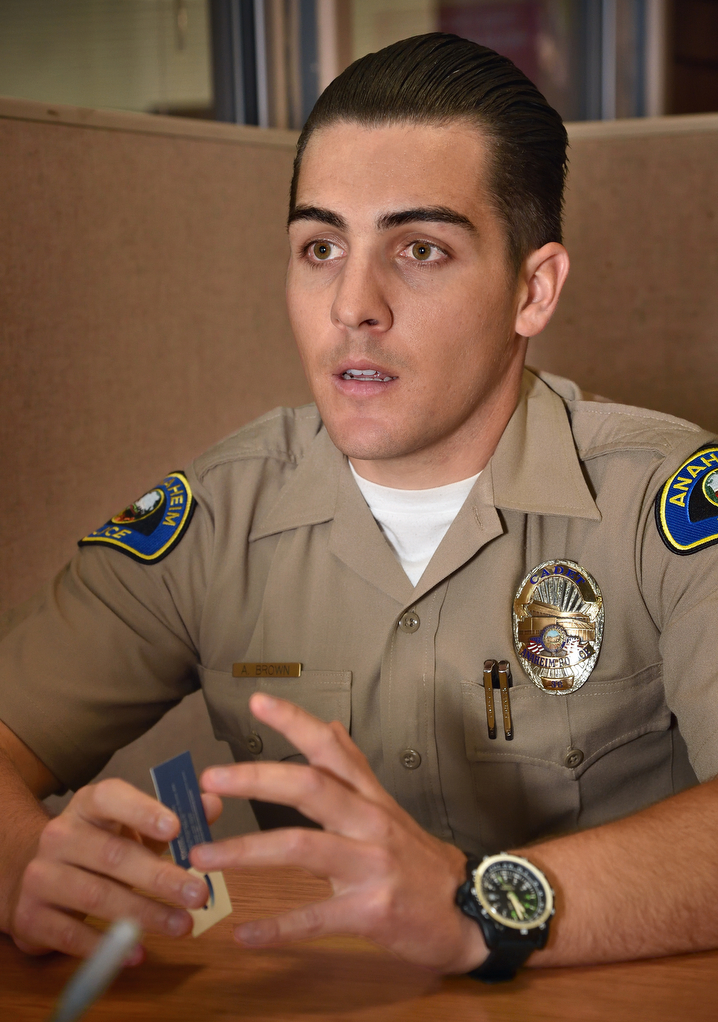
Anaheim Police Cadet Austin Brown talks about his goal of a law enforcement career, perhaps working one day in the detail where he now serves as a cadet.
Photo by Steven Georges/Behind the Badge
“It’s pretty different every day,” Brown said. “I just try to help them out as much as I can so that the officers can focus as much as they can on their investigations, and anything I could take off their plate, I’m happy to do.”
Working at the Anaheim Police Department, Brown said, forces cadets to mature quickly.
“You have a lot of responsibility here,” he said. “You may have somebody who’s twice your age at the front counter and you’re solving their problems for them… We treat everybody with the greatest respect we can.”
Variety in every day
Klotz, a burglary and auto theft cadet, chose her detail carefully. She requested the burglary and auto theft detail when she learned about the variety of criminal cases the group handles, including burglary, auto theft, vandalism, arson, animal cruelty, and more.
“Our detectives are inundated with work,” said Sgt. Darrin Lee, who oversees the unit. “We’re just one small section of the police department, but we handle over half the cases for our city.”
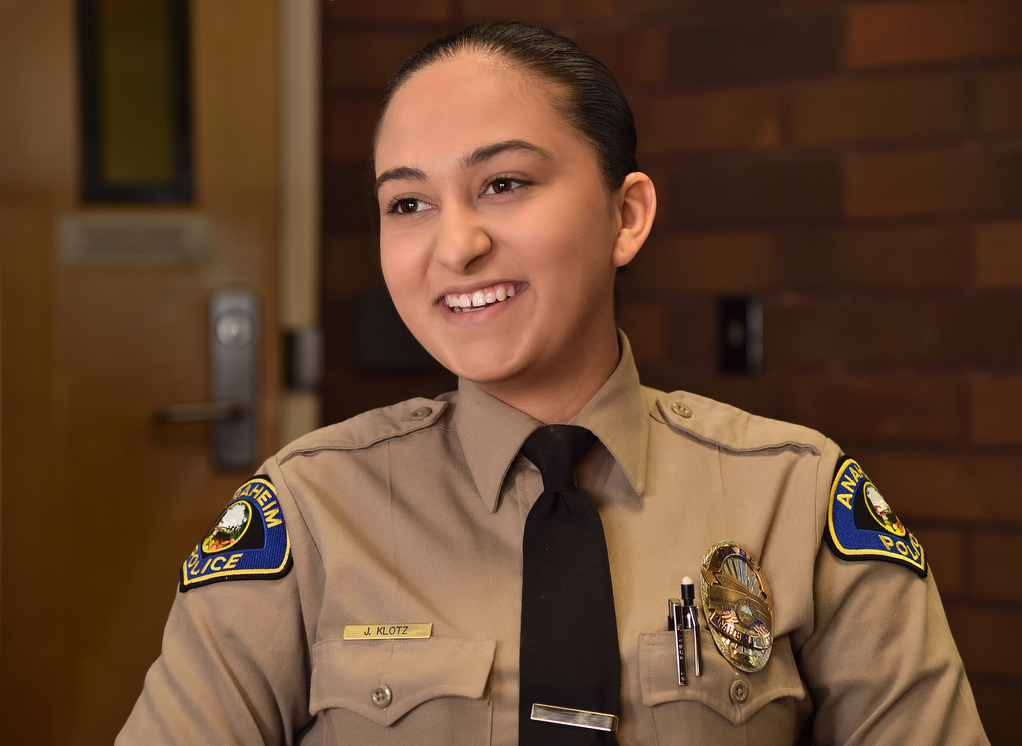
Anaheim Police Cadet Jillian Klotz works in the auto theft and burglary detail.
Photo by Steven Georges/Behind the Badge
The unit’s eight detectives were getting backed up due to the large caseload coming in, Lee said, so when Klotz created a system where she reviews the cases in each detective’s queue and filters them by priority and the needed follow-up work, the unit was thrilled.
“One detective indicated it was a game changer for him because he got to clear several cases based on her efforts,” Lee said. He wrote a commendation for Klotz for her excellent work. “I like the fact she stepped out of the box and found ways to help.”
“We’ve got over 2,000 cases… so every little thing she can do helps,” Lee said.
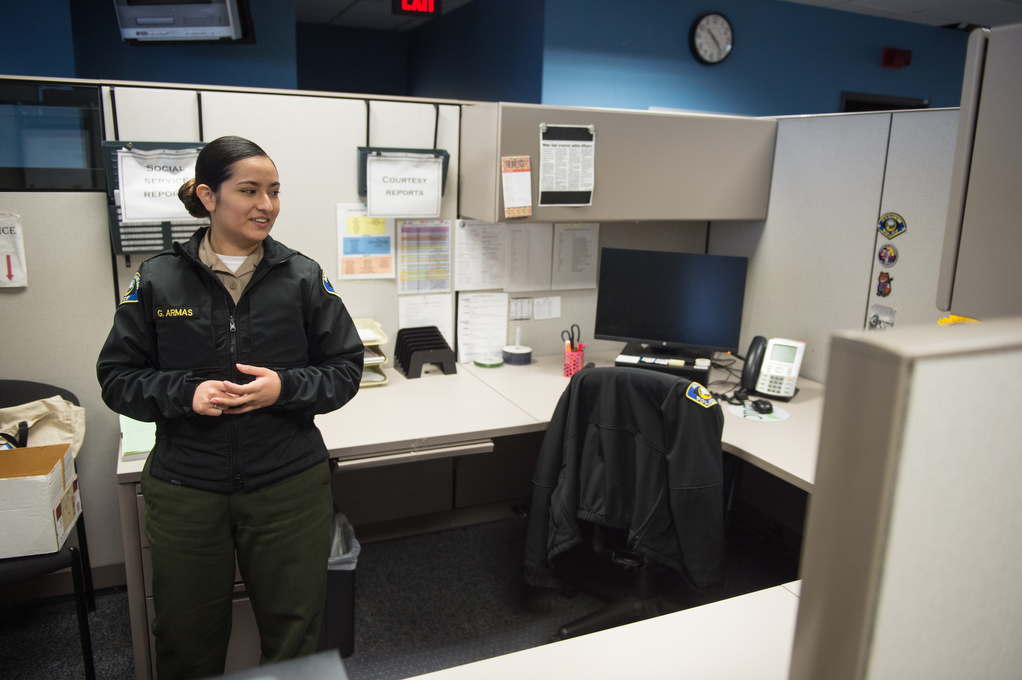
Anaheim Police Department Cadet Geraldi Armas has a desk upstairs at the Orange County Family Justice Center.
Photo by Stephen Carr/Behind the Badge
One of the best things about being a cadet, Klotz said, is being able to go on ride-alongs with the officers. On slow days, the officers work with her on mock traffic stops and arrest and control tactics.
“That gives me that in-field experience of being able to get out and actually deal with people one-on-one, face-to-face, without being behind the cover and being able to actually compassionately talk to somebody and see how the investigation goes when the suspect is there versus when they’re not,” Klotz said.
Like Brown, Klotz comes from a family of law enforcement, and she chose that path at an early age. She’s working toward a criminal justice degree with a minor in forensic science from Cal State Long Beach.
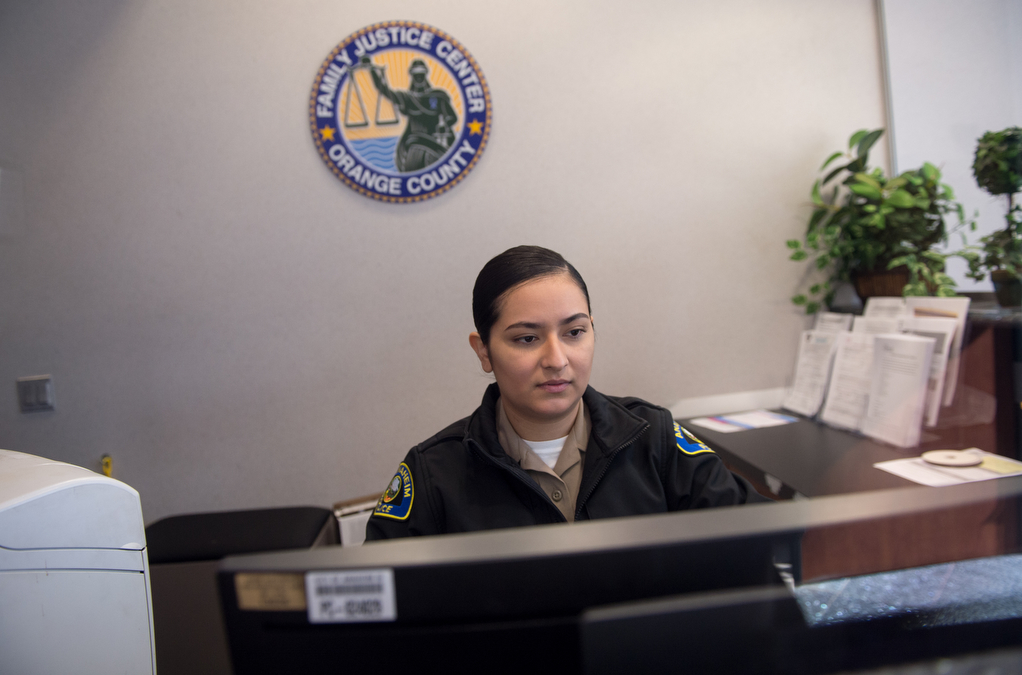
Anaheim Police Cadet Geraldi Armas works the front desk, filling in for a coworker who is on family leave, at the Orange County Family Justice Center.
Photo by Stephen Carr/Behind the Badge
In her detail, Klotz files cases through the District Attorney’s online system, creates PIO videos asking for public assistance finding suspects using surveillance footage, and visits other agencies working on the same cases to collect evidence. She also developed a case log to organize the detectives’ queues.
“It’s helped make cases be solved a little quicker,” Klotz said. “That’s probably the biggest accomplishment.”
Klotz, an avid equestrienne, hopes to one day join the Anaheim Police Department’s Mounted Enforcement Unit.
“I’m actually very, very glad that I put in at Anaheim,” Klotz said.
Apply for a cadet job with the Anaheim Police Department here.
 Behind the Badge
Behind the Badge
